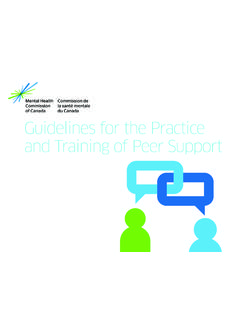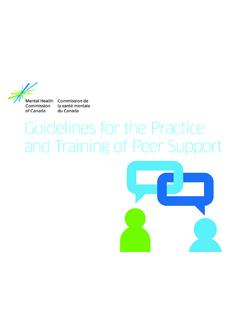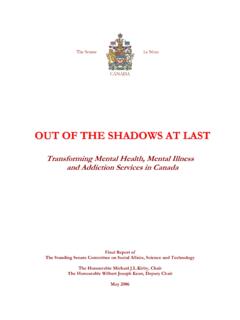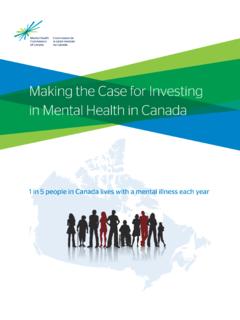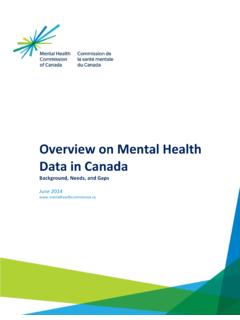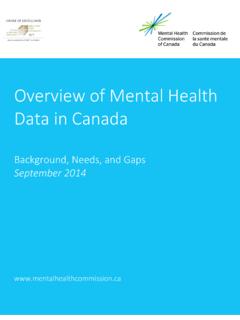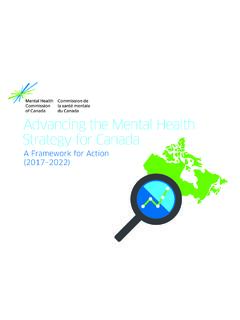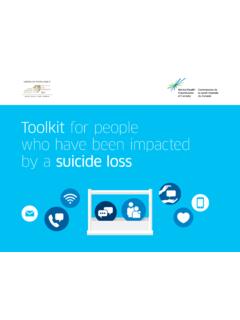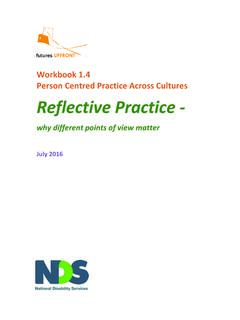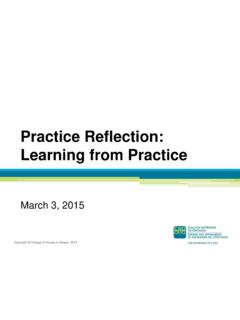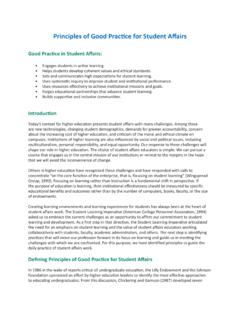Transcription of Guidelines for Recovery-Oriented Practice
1 Guidelines for Recovery-Oriented PracticeHope. Dignity. | Guidelines for Recovery-Oriented PracticeAcknowledgementsThe Guidelines for Recovery-Oriented Practice were drafted by Howard Chodos, Sylvain d Auteuil, Neasa Martin and Glenna Raymond with assistance from Mary Bartram and Donna Lyons who helped draft Chapter 5 on Working with First Nations, Inuit and M tis. Support was provided throughout the process by the recovery Initiative team at the Mental Health are grateful for the assistance of the following people who commented on the first draft of the Guidelines : Shana Calixte, Thomas Grauman, John Higenbottam, Vicky Huehn, Simran Lehal, Kwame McKenzie, Myra Piat, Nancy Reynolds, Marta Sadkowski, Aseefa Sarang, Deborrah Sherman, Kim Sunderland, Jijian Voronka, and Kimberly Wilson. We would also like to thank the recovery champions, known as the G22, who provided advice on all aspects of the MHCC s recovery Initiative from its inception in April 2013, as well as all those who contributed comments and suggestions during the consultation process on the draft Mental Health Commission of Canada gratefully acknowledges the permission granted by the Commonwealth of Australia to use and adapt material from A national framework for Recovery-Oriented mental health services: Guide for practitioners and providers ( State of Victoria, Australia 2013) for this document, which is intended for distribution only in document est disponible en fran ais.
2 This document is available at Health Commission of Canada. (2015). recovery Guidelines Ottawa, ON: Author. 2015 Mental Health Commission of CanadaProduction of this document is made possible through a financial contribution from Health Canada. The views represented herein solely represent the views of the Mental Health Com-mission of : 978-0-9880506-3-1 Legal deposit National Library of CanadaMental Health Commission of Canada Commission de la sant mentale du Canada | 3 4 Forewords 8 INTRODUCTION: Guidelines for Recovery-Oriented Practice in Canada 19 CHAPTER 1: Creating a Culture and Language of Hope 22 Guideline 1: Promoting a Culture and Language of Hope and Optimism 24 CHAPTER 2: recovery is Personal 30 Guideline 2A: recovery is Person First and Holistic 32 Guideline 2B: Affirming Autonomy and Self-Determination 34 Guideline 2C: Focusing on Strengths and Personal Responsibility 36 Guideline 2D: Building Collaborative Relationships and reflective Practice 38 CHAPTER 3: recovery Occurs in the Context of One's Life 44 Guideline 3A: Recognizing the Value of Family, Friends and Community 46 Guideline 3B.
3 Supporting Social Inclusion and Advocacy on Social Determinants 48 Guideline 3C: Addressing Stigma and Discrimination 50 Guideline 3D: Building Partnerships with Community 52 CHAPTER 4: Responding to the Diverse Needs of Everyone Living in Canada 58 Guideline 4A: Responsive to the Diverse Needs of Everyone Living in Canada 60 Guideline 4B: Responsive to Needs across the Lifespan 62 Guideline 4C: Responsive to the Needs of Immigrants, Refugees, Ethno-Cultural and Racialized (IRER) Communities. 64 Guideline 4D: Responsive to Gender Differences and to the Needs of Lesbian, Gay, Bisexual, Two-Spirited, Trans-Gendered, and Trans-Sexual People, their Families of Choice and Communities. 66 CHAPTER 5: Working with First Nations, Inuit and M tis 74 Guideline 5: Working with First Nations, Inuit and M tis 78 CHAPTER 6: recovery is About Transforming Services and Systems 84 Guideline 6A: recovery Vision, Commitment and Culture 86 Guideline 6B: Acknowledging, Valuing and Learning from People s Experiential Knowledge and from Families, Staff and Communities 88 Guideline 6C: recovery -Promoting Service Partnerships 90 Guideline 6D: Workforce Development and Planning 92 Getting Started and Measuring Progress 97 ConclusionContents4 | Guidelines for Recovery-Oriented PracticeIt is with great pleasure and pride that I present the Guidelines for Recovery-Oriented Practice .
4 Since its inception, the Mental Health Commission of Canada has made it a priority to work with people from across the country on ways to improve mental health systems based on a recovery orientation. recovery approaches stand on two pillars. First, they recognize that each person is a unique individual with the right to determine his or her own path towards mental health and well-being. Second, they also understand that we all live our lives in complex societies where many intersecting factors (biological, psychological, social, economic, cultural and spiritual) have an impact on mental health and well-be-ing. These Guidelines encompass both dimensions, and in so doing address everyone with direct experience of mental health problems and those who support them, as well as the many communities in all their diversity in which people live, work and play. The development of these Guidelines flows directly from recom-mendations in Changing Directions, Changing Lives: The Mental Health Strategy for Canada, released in May 2012.
5 However, the impetus in Canada for embracing a recovery orientation stretches further back to the landmark Senate Committee report, Out of the Shadows at Last (2006). The roots of the recovery movement lie deeper still, nourished by decades of experience and advocacy by people with lived experience of mental health problems and ill-nesses and by the pioneering work of early champions and prac-titioners. This movement has been embraced in many countries, to the point that it has been called the new paradigm for mental health. My enthusiasm for these Guidelines does not stem only from my conviction that they represent another step towards the creation of a mental health system that can respond to the full range of mental health needs of everyone living in Canada. It also reflects the personal values and commitments that have guided me during my many years of work at every level of the mental health system. The Guidelines concretize what a Recovery-Oriented system looks like and will help us build a holistic, person-centred and person-di-rected system, one that is grounded in best and leading practices and treats all people with dignity and , I am proud to say that, while the MHCC is always learn-ing how to better incorporate a recovery perspective in its work, the recovery principles that infuse the Guidelines are already embedded in its initiatives.
6 They are clearly visible in areas such as housing and homelessness and our ongoing efforts to address FOREWORDSM ental Health Commission of Canada Commission de la sant mentale du Canada | 5stigma and discrimination; they are likewise reflected in the importance the Commission has attached to improving mental health in the workplace. These Guidelines help to strengthen the foundation for change. They have drawn on the best international Practice as well as on the knowledge and experience of people from coast to coast to coast in Canada. They provide support and encouragement for the many excellent Recovery-Oriented initiatives already underway, as well as inspiration for new ways of think-ing and doing. To help them come alive, we need to make them a reference point for everyone who is part of, or who engages with, the mental health system, as well as all those who are working in areas that have an impact on people s mental health and well-being. The mental health landscape in Canada has changed significantly for the better over the past decade.
7 These Guidelines are a major addition to our collective resources and will help ensure that the momentum for change continues BradleyPresident and Chief Executive Officer, Mental Health Commission of CanadaFOREWORDS6 | Guidelines for Recovery-Oriented PracticeRecovery is on the lips of many in the mental health community, and those of us who live and breathe this Practice know that the tide is turning in our mental health system. It is with great enthusiasm that I support the Mental Health Commission of Canada (MHCC) as it launches these recovery -ori-ented Guidelines . With the support of service providers and policy makers across the country who have already embraced a recovery approach, the Guidelines will help change the way we Practice men-tal health care in this many of us experiencing mental health challenges and illness-es, recovery the Practice , the philosophy and the hard work is not just a word, but an actual process. recovery is made possible by having a safe space to be ourselves, and to find friends, family and peers who know and understand our experiences; it s nurtured when our voices are heard, and we get to speak our stories of cour-age and resilience.
8 recovery is about hope. Every day, as the director of a peer -run mental health service, I see the real effects of discrimination and stigma. recovery is quite difficult when your experience has marginalized you by racism, sexism, homophobia, poverty, transphobia, histories of trauma and colonization, as well as by mental illness. A recovery lens allows us to appreciate the various ways we engage with the mental health system; it recognizes the value of working collaboratively across sectors, the important practices of peer support, respectful rela-tionships, mutuality and equity, the social determinants of health and, of course, advocacy. Recovery-Oriented Practice can help us trust in the work that happens on the ground and at the grassroots in order to make fundamental changes to our mental health are in the midst of a powerful movement started by those with lived experience of mental illness, who knew that there was some-thing much more to life besides diagnoses and dire conclusions that nothing would get better a movement that is gaining ground and changing lives.
9 I am eager to see how these Guidelines are embraced by all of us in mental health care. I am inspired by the MHCC and all who have worked hard to develop the practices that are vital for keeping this movement marching forward. Shana CalixteExecutive Director, NISA/Northern Initiative for Social ActionFOREWORDSM ental Health Commission of Canada Commission de la sant mentale du Canada | 7 What does recovery mean to those of us living with a mental health problem? It does not necessarily mean regaining the life and person we were before. Often, recovery is a journey towards a new life that better reflects our identity, our needs and our deepest desires. recovery can bring us precious and unexpected , recovery is currently trending. And trendy words can some-times become empty vessels that certain people will fill with their own interests, whether political, economic, corporate or clinical. For example, some of us believe, not without reason, that there is a risk of some of the principles associated with the recovery approach, such as autonomy and peer accountability, being hijacked.
10 We fear seeing the approach being used to justify cutting services and, con-sequently, downloading even more of the weight of the recovery process onto the already overloaded shoulders of our peers and the members of their networks. Since it is an approach whose roots are entwined with the very roots of the user movement, it is up to us to remain vigilant so that recovery retains its true nature. For this reason, I am pleased to support the efforts of the Mental Health Commission of Canada in publishing and disseminating the Guidelines for Recovery-Oriented Practice , a document that, in my view, infuses the term recovery with the full meaning we want it to have. It is no surprise that at least half of the team contributing to the Guidelines have lived ex-perience of recovery . Empowerment is not a privilege bestowed on someone but a right that peers must acknowledge. For this condition to become an inte-gral part of our Canadian mental health system, leaders of the user movement must come together to embody this empowerment and ensure that the roots of our movement constitute the core of the identity and values of the broader recovery movement.
